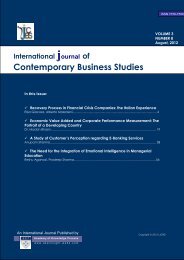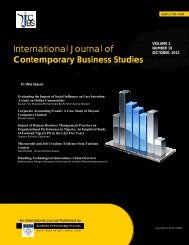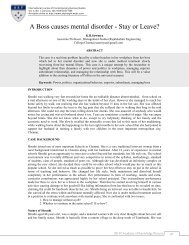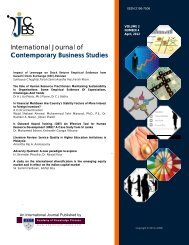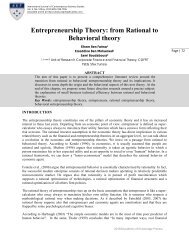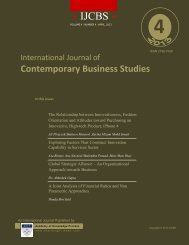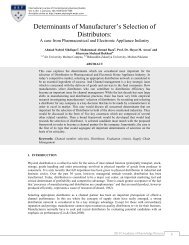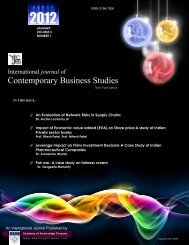Contemporary Business Studies - Academy of Knowledge Process ...
Contemporary Business Studies - Academy of Knowledge Process ...
Contemporary Business Studies - Academy of Knowledge Process ...
Create successful ePaper yourself
Turn your PDF publications into a flip-book with our unique Google optimized e-Paper software.
International Journal <strong>of</strong> <strong>Contemporary</strong> <strong>Business</strong> <strong>Studies</strong>Vol: 4, No: 2. February, 2013 ISSN 2156-7506Available online at http://www.akpinsight.webs.comgovernment agencies (such as, the CIA, the FBI, the IRS etc.) to uncover and investigate leading frauds.They became financial detectives—independent experts employed by management to uncover fraudulentfinancial reporting and misappropriated assets. To combat the frauds effectively one needs the activesupport <strong>of</strong> government at every stage. There are three-four such agencies in India, which are dedicated tothe mission <strong>of</strong> combating frauds. Serious Fraud Office looks into violations <strong>of</strong> Income Tax, FEMA, RBIAct, etc.; CBI (Economic Office Wing) deals with big financial frauds; Central Vigilance Commissiondeals with corruption are the major government agencies that combat frauds <strong>of</strong> different types. In thecurrent reporting environment, undoubtedly, FA’s are in great demand for their accounting, auditing,legal, and investigative skills. They can play a vital role in coordinating company efforts to achieve acohesive policy <strong>of</strong> ethical behavior within an organization.The definitions <strong>of</strong> forensic accounting are changing in response to the growing needs <strong>of</strong> the corporations.Bologna and Lindquist (1995) have defined forensic accounting as “the application <strong>of</strong> financial skills, andan investigative mentality to unresolved issues, conducted within the context <strong>of</strong> rules <strong>of</strong> evidence. As anemerging discipline, it encompasses financial expertise, fraud knowledge, and a sound knowledge andunderstanding <strong>of</strong> business reality and the working <strong>of</strong> the legal system.” Another view, held by Singletonand Singleton (2010), is that “forensic accounting is the comprehensive view <strong>of</strong> fraud investigation. Itincludes preventing frauds and analyzing antifraud controls… It also includes the gathering <strong>of</strong> nonfinancialinformation.” According to the definition developed by the AICPA’s ‘Forensic and LitigationServices Committee,’ “forensic accounting may involve the application <strong>of</strong> special skills in accounting,auditing, finance, quantitative methods, the law, and research. It also requires investigative skills tocollect, analyze, and evaluate financial evidence, as well as the ability to interpret and communicatefindings. Forensic accounting encompasses litigation support, investigation, and dispute resolution and,therefore, is the intersection between accounting, investigation and the law.” In deed, forensic accountingincludes the use <strong>of</strong> accounting, auditing and investigative skills to assist in legal matters. Similarly,Golden et al., (2011) describes as, “Forensic accounting consists <strong>of</strong> two major components: litigationservices that recognize the role <strong>of</strong> an accountant as an expert consultant, and investigative services thatuse a forensic accountant’s skills and may require possible courtroom testimony.” This implies that theFA’s should be skilled not only in financial accounting, but also in internal control systems, the law, otherinstitutional requirements, investigative pr<strong>of</strong>iciency, and interpersonal skills. Corporations can rely on“FA’s skills for developing a consistent system <strong>of</strong> CG, disseminating such information within and outsidethe company, ensuring that governance policies and objectives are interwoven into the internal controlsystem, setting up fraud prevention systems, and investigating any existing fraud.” The accountants arealready trained in many <strong>of</strong> the skills required for such tasks, but they need some additional specializedskills to the skills <strong>of</strong> a traditionally trained accountant.FA’s are expected to be a ‘specialist’ in accounting and financial systems. Yet, as companies continue togrow in size and complexity, ‘uncovering’ fraud requires FA’s to become ‘pr<strong>of</strong>icient’ in an everincreasingnumber <strong>of</strong> “pr<strong>of</strong>essional skills and competencies”. So what personal ‘skills’ are required tobecome an efficient FA? So far, several studies have been conducted to find out the core skills andcompetencies required on the part <strong>of</strong> FA’s. Unfortunately, there is a lack <strong>of</strong> consensus on this issue.In addition to the specialized knowledge about the techniques <strong>of</strong> finding out the frauds, one needspatience and analytical mindset. One has to look beyond the numbers and grasp the substance <strong>of</strong> thesituation. It is basically the work <strong>of</strong> the intelligent accountants. There is a need for the same basicaccounting skills that it takes to become a good auditor plus the ability to pay attention to the smallestdetail, analyze data thoroughly, think creatively, possess common business sense, be pr<strong>of</strong>icient with acomputer, and have excellent communication skills (Bhasin, 2007). A “sixth” sense that can be used toreconstruct details <strong>of</strong> past accounting transactions is also beneficial. A photographic memory helps whentrying to visualize and reconstruct these past events. The forensic accountant also needs the ability tomaintain his composure when detailing these events on the witness stand. Finally, a forensic accountant2013©<strong>Academy</strong> <strong>of</strong> <strong>Knowledge</strong> <strong>Process</strong>63



